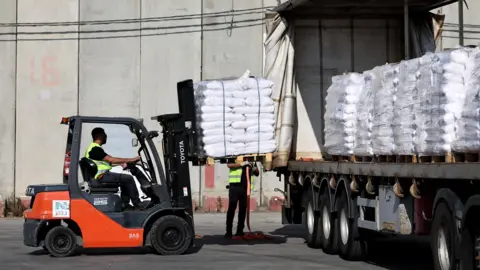The humanitarian situation in Gaza is becoming increasingly dire, with a recent report confirming that over 90 lorry loads of aid have just been delivered to the region, following a three-day delay at the Kerem Shalom crossing. This crossing, the only point of land access for humanitarian supplies into Gaza, had been under an 11-week blockade enforced by Israel, which recently eased restrictions for the first time. The aid includes essential items such as flour, baby food, and medical supplies, crucial for the 2.1 million residents suffering from acute shortages and escalating prices of basic necessities.
The United Nations (UN) has reported that the delays in aid delivery were primarily due to security concerns regarding the approved transport routes. Despite these challenges, Israeli authorities stated that they permitted an additional 100 lorry loads through the crossing on the same day, although UN representatives emphasized that these efforts were insufficient to meet the vast humanitarian needs in Gaza. The stark reality is that humanitarian organizations have been sounding the alarm over widespread hunger and malnutrition, exacerbated by ongoing conflicts and blockade restrictions.
In a tragic reflection of the crisis, Palestinian Authority Health Minister Majed Abu Ramadan revealed in Geneva that 29 children died in recent days from starvation-related causes. Additional assessments indicate that approximately half a million individuals in Gaza are at risk of starvation in the coming months, highlighting the severity of the crisis the population is enduring. The UN-backed Integrated Food Security Phase Classification (IPC) has expressed grave concern about the growing hunger levels in Gaza, asserting that immediate action is needed to avert disaster.
On Wednesday night, it was announced that UN teams, despite the operational hurdles, successfully transported the aid collected from the Kerem Shalom crossing into Gaza, utilizing a convoy of lorries. Images circulated by various news outlets depicted scenes at bakeries in Gaza that were already producing bread with the supplied flour. This operation, although a small step in the right direction, still fundamentally underscores the ongoing challenges faced in the region. The World Food Programme (WFP) is actively working towards distributing the aid to reach the families most in need.
However, despite the aid efforts, humanitarian organizations continue to express that a meager trickle of supplies is grossly inadequate. The International Committee of the Red Cross (ICRC) has also stressed that without a significant increase in deliveries, the existing infrastructure and health services in Gaza, which are already overstretched, will remain incapable of meeting basic needs. The situation has only worsened since the resumption of Israeli military operations earlier this year, further complicating relief efforts.
Israel’s military strategy includes the assertion that there is no shortage of supplies in Gaza, accusing Hamas of diverting resources for military purposes, a claim the group has categorically denied. The UN likewise refuted these accusations, reminding Israel of its obligations under international humanitarian law to ensure that aid reaches those in desperate need. Israeli Prime Minister Benjamin Netanyahu has publicly reiterated that limited food supplies are being allowed into Gaza to maintain operational efficacy during military offensives.
Compounding the crisis are the wider implications of military actions on civilian life in Gaza. The report indicates that on May 22, 2025, over one hundred fatalities were reported due to ongoing bombardment, with further evacuations mandated by Israeli authorities affecting numerous neighborhoods. Over 81% of the territory has been classified as either dangerous zones or areas under evacuation orders, with an estimated 600,000 individuals displaced since March.
As the conflict escalates, the war’s toll on civilians mounts alarmingly. Reports suggest that approximately 53,762 individuals, including a substantial number of children, have died since hostilities reignited in October 2023. The UN indicates that immediate and sustained increases in aid deliveries are vital for addressing the catastrophic humanitarian needs that have arisen in Gaza amidst the environment of war, poverty, and political strife.
This entire situation illustrates not only the urgent need for unilateral humanitarian access but also highlights the importance of reinstating discussions aimed at a long-term resolution that guarantees safety and basic human rights for all individuals caught in this volatile situation. Humanity’s response must reflect compassion, urgency, and unwavering support in returning to a path of peace for Gaza and its inhabitants.



